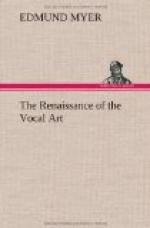These flexible, vitalized movements are not generally understood or used, because they have not been in the line of thought or study of the rigid muscular school or the limp relaxed school; and yet they are destined to influence sooner or later all systems of singing. They have been used more or less in all ages by great artists. It is strange that they are not better understood by the profession.
* * * * *
In this connection it might be well to speak of the importance of physical culture for the singer. A series of simple but effective exercises should be used, exercises that will develop and vitalize every muscle of the body. There are also nerve calisthenics, nervo-muscular movements, which strengthen and control the nervous system. These nerve calisthenics generate electrical vitality and give life and confidence. “The body by certain exercises and regime may be educated to draw a constantly increasing amount of vitality from growing nature.”
A singer to be successful must be healthy and strong. He should take plenty of out-door exercise. Exercise, fresh air, and sunlight are the three great physicians of the world. But beside this, all singers need physical training and development, which tense and harden the muscles, and increase the lung capacity; that training which expands all the resonance cavities, especially the chest, and which directly develops and strengthens the vocal muscles themselves, particularly the extrinsic and intrinsic muscles of the throat. As we have learned, a trained muscle responds more spontaneously to thought or will than an uneducated one; flexible spontaneity the singer always needs. Beyond a doubt, the singer who takes a simple but effective course of physical training in connection with vocal training will accomplish twice as much in a given time, in regard to tone, power and control, as he could possibly do with the vocal training alone. This is the day of physical training, of physical culture in all things; and the average vocal teacher will have to awake to the fact that his pupils need it as much as, or more than, they need the constant practice of tone.
Of course it is not possible to give a system of physical training in a small work like this. The student of the voice can get physical training and physical culture from many teachers and many books. It may not be training that will so directly and definitely develop and strengthen the vocal muscles and the organ of sound itself, or training that will so directly influence the voice as does our system, which is especially arranged for the singer; but any good system of physical development, any system that gives the student health and strength, is good for the singing voice. “Activity is the source of growth, both physical and mental.” “Strength to be developed, must be used. Strength to be retained, must be used.”




